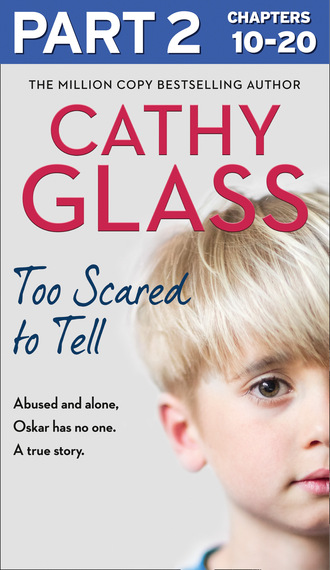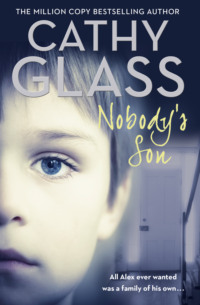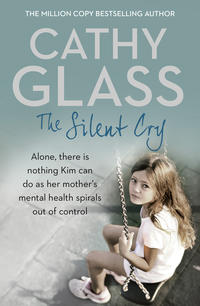
Полная версия
Too Scared to Tell: Part 2 of 3
‘I’m seeing your mother next week,’ Tamara continued. ‘She has arranged to take an afternoon off work.’ The fact that she’d mentioned Roksana taking time off work suggested it might have been an issue, but I knew that the Guardians only usually worked office hours, and it was expected that the parent(s) made time to see them. I hoped Roksana understood the importance of the Guardian’s role.
Tamara then asked me how Oskar was settling in, about his routine and what he liked to do in his spare time as she made some notes. She gave me her business card listing her phone number and email address and said if Oskar or I had any questions I should contact her. She said she would see us at least once again before the final court hearing, which was set for October. She thanked me for my time and, having said goodbye to both of us, she left. Between now and October she would be gathering the information she needed to make a recommendation to the judge on whether Oskar could return to live with his mother.
It was now after five o’clock, so, setting the phone to speaker, I told Oskar it was time to call his mother. I said hello to Roksana and then passed the phone to him. ‘How are you?’ she asked.
‘Another social worker was here,’ he said.
‘Who?’ she asked anxiously. Oskar looked at me.
‘It was the Guardian ad Litem,’ I said into the speaker.
‘What did she want?’ she asked suspiciously. ‘She’s seeing me next week.’
‘It’s normal for the Guardian to see the child,’ I said, which I was sure would have been explained to her.
‘What did Oskar tell her?’
‘That he liked school and understood why he was in care. Try not to worry.’ I appreciated that parents with children in care must feel that a lot of meetings go on without them, which is true. I’m not the only one who would like to see more transparency in child-care proceedings. ‘I’ll let you and Oskar carry on chatting,’ I said. ‘Probably best not to quiz him about the Guardian’s visit, though.’
‘Have you been to school?’ she asked him.
‘Yes.’
‘Have you got homework?’
‘Yes.’
‘Make sure you do it.’
‘I will, I’m going to do it now,’ he said. ‘Bye.’
‘Bye, I’ll see you tomorrow.’
And that was that.
Of course I noted all this in my log as I was supposed to, while omitting my feeling that there was as much unsaid in these exchanges between Roksana and her son as there was said.
On Tuesday morning, notice of Oskar’s review arrived in the post. It was set for the following Monday at 2 p.m. at Oskar’s school. Children in care have regular reviews; the first takes place within four weeks of the child being placed or moving placement. The child’s parent(s), social worker, teacher, foster carer, the foster carer’s supervising social worker, and any other professionals or adults closely connected with the child are invited. Reviews are there to ensure that everything is being done to help the child, and that the care plan (drawn up by the social services) is up to date. They are chaired by an Independent Reviewing Officer (IRO), who also minutes the meeting. He is a qualified social worker with extra training but is unconnected with the social services. Very young children don’t usually attend their reviews; older children are expected to.
I completed my review form that morning – it took almost an hour. It asked questions about Oskar’s health, education, hobbies and interests, contact with family and friends, emotional well-being, and if the child’s cultural and religious needs were being met. Oskar’s form was a much shorter, child-friendly booklet designed to encourage the child to give their views on being in care. I’d help him complete it when we had the time and then post both forms to the reviewing officer, ready for the review on the following week.
That Tuesday afternoon, when Oskar and I arrived at the Family Centre, Roksana must have gone in just ahead of us. She was in reception signing the Visitors’ Book.
‘Hello,’ I said. She turned.
At this point most parents and children would fall into each other’s arms, but not Roksana and Oskar. Oskar dropped my hand but then looked at his mother carefully. Roksana declared, ‘I’m so stressed! Luka is ill again and I can’t afford to go back there now.’
‘I am sorry to hear that,’ I sympathized. ‘What a worry for you.’
‘It is!’ she said. ‘If it’s not one thing, it’s another!’
Oskar was looking anxious too, sharing his mother’s worries.
‘I’m sure Luka will be better soon,’ I told him, feeling he needed some reassurance.
‘I’m not,’ Roksana declared. ‘He keeps falling ill. As if I didn’t have enough to cope with already – with Oskar being in care.’ While I had every sympathy for her, I was concerned that Oskar could assume that being in care and all the worry it was causing his mother was his fault.
‘Shall we go to the room?’ I suggested, throwing Oskar a reassuring smile. I signed the Visitors’ Book.
‘You’re in Green Room again,’ the receptionist said, having heard our exchange. ‘You can go through. The contact supervisor is there.’
I thanked her and we went through the double doors and began down the corridor towards the room.
‘I know where it is,’ Roksana said curtly to me. ‘You don’t have to come with us.’
‘I’m supposed to see you into the room,’ I replied.
‘Don’t they trust me?’
‘It’s policy,’ I said diplomatically. But of course, had Roksana wanted to threaten Oskar not to tell, she could have done so in the short distance from reception to the room. There have been instances of a parent intimidating their child when they’ve gone to the toilet or to the kitchen for a glass of water. If the contact supervisor was doing her job properly, she wouldn’t let Roksana or Oskar out of her sight for a second.
Once in Green Room I said goodbye and have a nice time, then left. As contact was only an hour it wasn’t worth me going home. The weather was fine, so I went for a walk and then returned to collect Oskar at five o’clock. I knocked on the door and went in. It was very quiet and the room was tidy, so any games they’d been playing with had already been packed away. My first impression was that Roksana was a little less stressed. ‘Everything OK?’ I asked her, just being friendly.
‘Yes. I’ve been on the phone to my sister and Luka has stopped being sick,’ she said. ‘It seems it was just a stomach upset. He’s prone to getting them.’
‘That’s a relief,’ I said. But I looked at Oskar sitting passively on the sofa and wondered how much of the hour’s contact had been dedicated to him and how much to Luka. I appreciated what a worry it must be for Roksana, but I felt sorry for Oskar, who seemed to take second place – to his mother’s work and Luka.
It’s usual for the foster carer to leave the Family Centre with the child first to avoid any emotional or difficult situations developing outside, so I said goodbye to Roksana and that we’d phone her tomorrow.
‘Goodbye,’ Oskar said, standing, and he came straight to me.
‘Are you going to give your mother a kiss goodbye?’ I asked him.
Roksana had stood and was now checking her phone. Oskar dutifully returned to her. Not taking her eyes from her phone, she threw a half-hearted kiss in the direction of his head. No hug, no proper kiss goodbye. As he returned to me, I saw the look of disappointment on his face and I wished Roksana could have seen it too. Children thrive on attention and praise, and wither from emotional neglect.
‘Good boy,’ I said, smiling at him, and he took my hand.
Outside, I asked him if he’d had a nice time and he said, ‘Yes,’ although his voice was flat. I then asked him if he would like to invite a friend from school home for tea one afternoon, and he shrugged gloomily. ‘Think about it,’ I said. But I was beginning to wonder if Oskar was depressed. It was relatively unusual for a child of his age to be depressed, but it was something I would raise with his social worker. Some children are referred to CAMHS (Child and Adolescent Mental Health Services) for therapy when they come into care.
On Wednesday the phone call to Roksana was no better or worse than the previous ones. It was very short and uninspiring, and Oskar responded to his mother’s questions with ‘Yes’, ‘No’ or a shrug, which of course she couldn’t see. I prompted him with some topics he could talk to her about, but with the phone on speaker Roksana could hear me and said, ‘It’s OK if he doesn’t want to talk,’ and she said goodbye.
After dinner that evening I took out Oskar’s review form and explained to him what the review was all about, then we sat at the table in the kitchen-diner to complete it. He could read some of the questions and his writing was about average for a six-year-old. Some of the questions had a choice of emojis and didn’t require a written answer. To begin with his responses were pretty much what I would have expected of him.
How do you feel most of the time? He circled the emoji with a sad face.
Would you like to know more about your past? ‘Don’t mind,’ he wrote.
Who is your social worker? ‘Andrew.’
Would you like to see more of them? ‘No.’
Who are your friends? Would you like to see more of them? ‘Don’t mind.’
If you have any problems, who do you talk to? ‘Miss Jordan.’
‘I hope you can talk to me too,’ I reminded Oskar, and he nodded.
Do you have any questions about what is going to happen in the future? Most children would put: ‘When can I go home?’ But to my astonishment Oskar wrote: ‘Can I stay with Cathy?’
I turned and looked at him carefully. ‘Do you want to stay with me?’ I asked. ‘Or is it you think that’s what I want to hear?’
‘No, it’s true,’ he said in a tiny voice.
‘Why?’
He didn’t reply but read the next question: Is there anything you would like to add?
He paused thoughtfully and then wrote: ‘I don’t want to go home.’
‘Can you write why you don’t want to go home?’ I asked. It’s often easier to write something painful than to say it.
He paused again and then wrote: ‘It’s not safe.’
‘Why isn’t it safe?’ I asked. ‘Write it down.’
‘No, I can’t tell you,’ he whispered, and concentrated on the next question.
Конец ознакомительного фрагмента.
Текст предоставлен ООО «ЛитРес».
Прочитайте эту книгу целиком, купив полную легальную версию на ЛитРес.
Безопасно оплатить книгу можно банковской картой Visa, MasterCard, Maestro, со счета мобильного телефона, с платежного терминала, в салоне МТС или Связной, через PayPal, WebMoney, Яндекс.Деньги, QIWI Кошелек, бонусными картами или другим удобным Вам способом.











